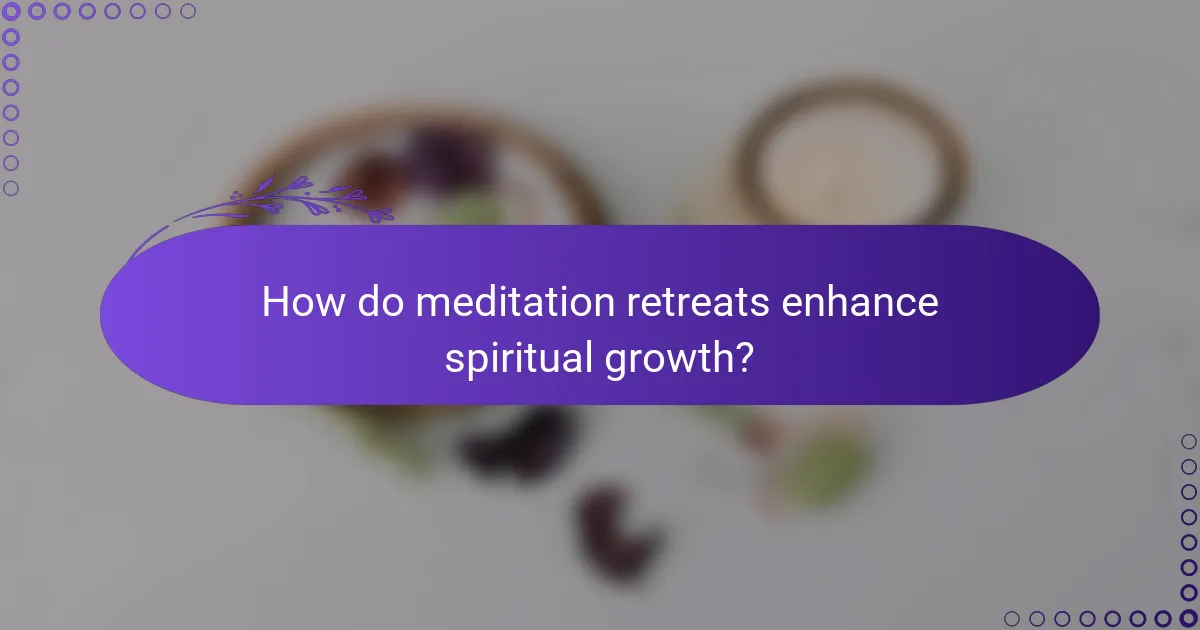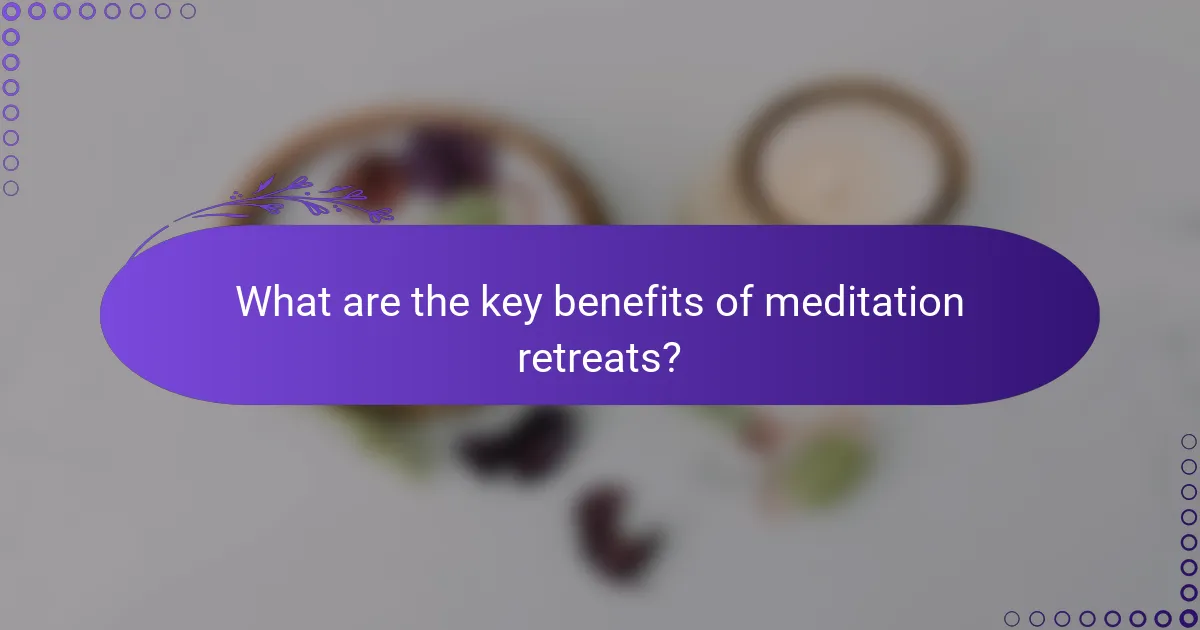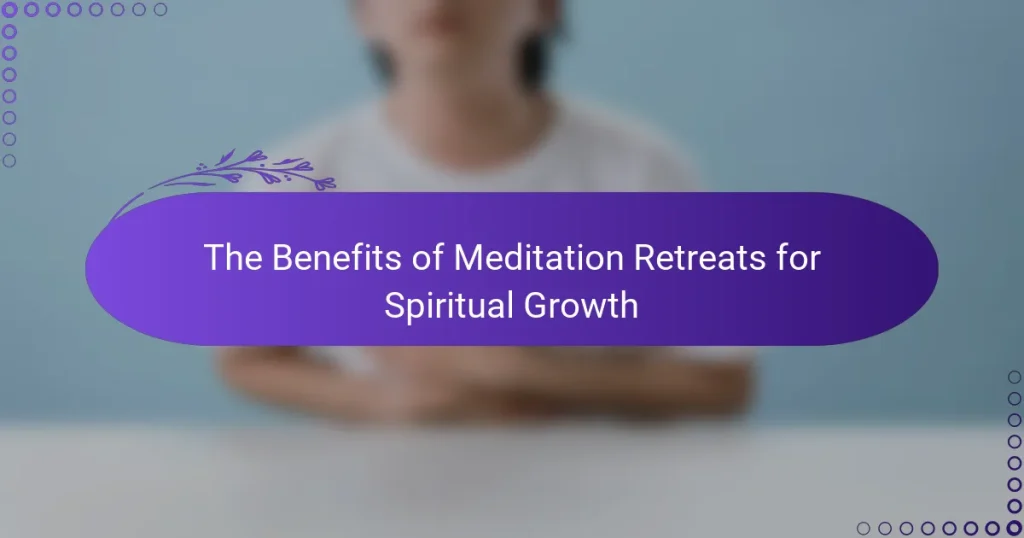Meditation retreats provide a unique opportunity for individuals seeking spiritual growth by creating an immersive environment conducive to deep introspection and self-discovery. By stepping away from everyday distractions, participants can engage in focused practices that promote relaxation, emotional healing, and enhanced mental clarity, ultimately fostering a profound connection with themselves and others.

How do meditation retreats enhance spiritual growth?
Meditation retreats significantly enhance spiritual growth by providing an immersive environment that fosters deep introspection and connection with oneself. Participants can step away from daily distractions, allowing for a focused exploration of their inner selves and spiritual practices.
Deepened self-awareness
During meditation retreats, individuals often experience a heightened sense of self-awareness. This is achieved through prolonged periods of silence and reflection, enabling participants to confront their thoughts, emotions, and behaviors without external influences.
Practicing techniques such as mindfulness and self-inquiry can lead to profound insights about personal values and life purpose. Many find that this deepened self-awareness helps them make more aligned choices in their daily lives.
Improved mindfulness practices
Meditation retreats provide structured environments to cultivate mindfulness practices effectively. Participants engage in various meditation techniques, which can enhance their ability to remain present and focused in everyday situations.
Regular practice during retreats can lead to lasting improvements in mindfulness, helping individuals manage stress and anxiety more effectively. Incorporating these practices into daily routines can result in a more balanced and fulfilling life.
Connection with nature
Many meditation retreats are held in serene natural settings, which can significantly enhance spiritual experiences. Being surrounded by nature fosters a sense of peace and connectedness that complements meditation practices.
Participants often find that spending time outdoors, whether through walking meditations or simply enjoying the scenery, deepens their spiritual connection and promotes a sense of belonging to the larger universe.
Community support
Retreats offer a unique opportunity to connect with like-minded individuals, creating a supportive community. Sharing experiences and insights with fellow participants can enhance personal growth and provide encouragement on the spiritual journey.
Building relationships with others who share similar goals can lead to lasting friendships and a sense of accountability, which can be beneficial for maintaining spiritual practices after the retreat ends.
Guidance from experienced instructors
Experienced instructors at meditation retreats provide valuable guidance and support, helping participants navigate their spiritual journeys. These instructors often share insights and techniques that can deepen meditation practices and enhance understanding.
Having access to knowledgeable mentors allows individuals to ask questions and receive personalized feedback, which can be instrumental in overcoming obstacles and deepening their spiritual growth.

What are the key benefits of meditation retreats?
Meditation retreats offer numerous advantages for spiritual growth, including deep relaxation, emotional healing, and improved mental clarity. Participants often experience a profound sense of connection to themselves and others, fostering personal development and inner peace.
Stress reduction
Meditation retreats are highly effective for stress reduction, as they provide a dedicated space for individuals to disconnect from daily pressures. By engaging in mindfulness practices, participants can lower cortisol levels and promote relaxation, leading to a calmer state of mind.
Many retreats incorporate guided meditations, yoga, and nature walks, which further enhance the stress-relief process. Regular attendance at these retreats can lead to long-term benefits, helping individuals manage stress more effectively in their everyday lives.
Emotional healing
Emotional healing is a significant benefit of meditation retreats, as they allow individuals to confront and process unresolved feelings. The supportive environment encourages self-reflection and vulnerability, creating opportunities for personal breakthroughs.
Participants often engage in practices such as journaling and group discussions, which can facilitate emotional release and foster a sense of community. This healing process can lead to improved relationships and a greater understanding of oneself.
Enhanced focus and clarity
Meditation retreats can significantly enhance focus and mental clarity by training the mind to concentrate on the present moment. Techniques such as breath awareness and visualization help participants develop sharper cognitive skills and improved attention spans.
Many attendees report a noticeable increase in productivity and creativity after completing a retreat. Regular meditation practice can lead to sustained improvements in focus, making it easier to tackle daily tasks and challenges.
Increased compassion
Attending a meditation retreat often cultivates a deeper sense of compassion for oneself and others. Through mindfulness practices, participants learn to recognize their own suffering and that of those around them, fostering empathy and understanding.
Retreats may include loving-kindness meditation, which specifically focuses on developing compassion. This practice can lead to more meaningful connections and a greater commitment to helping others in the community.

What types of meditation retreats are available in the US?
In the US, various meditation retreats cater to different needs and preferences, including silent retreats, yoga and meditation retreats, spiritual discovery retreats, and group retreats. Each type offers unique experiences and benefits for spiritual growth, allowing participants to deepen their practice in a supportive environment.
Silent retreats
Silent retreats focus on extended periods of silence, allowing participants to turn inward and cultivate mindfulness. These retreats typically last from a weekend to several weeks and emphasize meditation practices without verbal communication, which can enhance self-awareness and clarity.
When considering a silent retreat, look for locations that provide a serene environment, such as natural settings or dedicated meditation centers. Common practices include guided meditations, walking meditations, and periods of reflection, often structured around a daily schedule.
Yoga and meditation retreats
Yoga and meditation retreats combine physical postures with mindfulness practices, promoting holistic well-being. These retreats often include daily yoga sessions alongside meditation practices, helping participants connect their bodies and minds.
Many of these retreats are held in tranquil settings, such as coastal areas or mountain resorts, and may last from a few days to a week. Participants should consider their experience level in yoga and meditation when selecting a retreat, as some may cater to beginners while others target advanced practitioners.
Spiritual discovery retreats
Spiritual discovery retreats focus on exploring personal beliefs and spiritual practices, often incorporating various modalities such as meditation, journaling, and group discussions. These retreats aim to foster a deeper understanding of oneself and one’s spiritual path.
Typically lasting from a weekend to a week, these retreats may include workshops led by experienced facilitators. Participants should seek retreats that align with their spiritual interests, whether they are rooted in specific traditions or more eclectic approaches.
Group retreats
Group retreats emphasize community and shared experiences, allowing participants to connect with others on similar spiritual journeys. These retreats often include group meditations, discussions, and activities designed to foster connection and support.
Group retreats can vary in length and may focus on specific themes or practices. When choosing a group retreat, consider the group size and dynamics, as a smaller group may offer more intimate interactions, while larger groups can provide diverse perspectives and experiences.

How to choose the right meditation retreat?
Choosing the right meditation retreat involves assessing your personal goals, researching suitable locations, and evaluating the credentials of instructors. This process ensures that the retreat aligns with your spiritual growth objectives and provides a supportive environment.
Consider your goals
Identifying your goals is crucial when selecting a meditation retreat. Whether you seek stress relief, deeper spiritual understanding, or community connection, your objectives will guide your choice. Reflect on what you hope to achieve and how intensive you want the experience to be.
For example, if your aim is to deepen your practice, look for retreats that offer extended silent periods and advanced teachings. Conversely, if you are new to meditation, a beginner-friendly retreat with guided sessions may be more suitable.
Research retreat locations
Location plays a significant role in the overall experience of a meditation retreat. Consider factors such as accessibility, natural surroundings, and the type of environment that resonates with you. Popular locations often include serene natural settings like mountains, forests, or coastal areas.
When researching, check if the retreat is easily reachable from your home or if it requires international travel. Additionally, look into the local culture and climate, as these can impact your comfort and engagement during the retreat.
Evaluate instructor credentials
The qualifications and experience of the instructors are vital to the quality of the retreat. Investigate their backgrounds, meditation styles, and teaching philosophies. Look for instructors who have extensive experience and are recognized within the meditation community.
Consider reading reviews or testimonials from past participants to gauge the effectiveness of the instructors. A well-qualified instructor can significantly enhance your learning and personal growth during the retreat.


